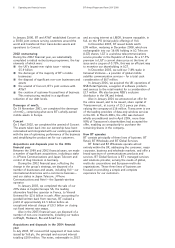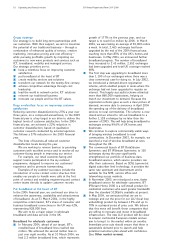BT 2004 Annual Report Download - page 19
Download and view the complete annual report
Please find page 19 of the 2004 BT annual report below. You can navigate through the pages in the report by either clicking on the pages listed below, or by using the keyword search tool below to find specific information within the annual report.among other things, the availability in the UK of a
wide range of electronic communications services.
&the duty to have regard to the principles under
which its regulatory activities should be
transparent, accountable, proportionate,
consistent and appropriately targeted.
&the duty to review regulatory burdens on a regular
basis and ensure that they do not involve the
imposition or maintenance of unnecessary
burdens.
&the functions of setting conditions of entitlement
(see Regulatory conditions), and enforcing those
conditions (see Enforcement). Ofcom’s decisions
are subject to appeal on the merits (see Appeals).
In carrying out its duties, Ofcom must consider
promoting competition and the use of effective
self-regulation; encouraging investment and
innovation; and encouraging the availability and use of
high-speed data services (including broadband).
Regulatory conditions
Under the new framework, based on 2003 EU
Directives, providers are no longer required to obtain
licences before offering telecommunications services.
Individual licences, such as that granted to BT in 1984,
no longer exist. Instead, there is a general
authorisation for anybody who wishes to provide
electronic communications networks and services.
Regulation is applied through separate sets of
conditions made by Ofcom, of which some apply to all
relevant communications providers and others are
imposed individually on particular providers which,
following a review of the relevant markets, are found to
have SMP, or which are designated as ‘‘universal
service providers’’. Other general obligations are set
out in the Communications Act. The general and
specific obligations that form BT’s regulatory
environment are described below.
Conditions applying to all providers of electronic
communications networks or services
General conditions
The foundation of the new regulatory framework is the
set of general obligations referred to in the
Communications Act as ‘‘general conditions’’. These
apply to all providers of electronic communications
networks or services, including ‘‘systemless’’ service
providers and internet service providers. These general
conditions are mainly concerned with consumer
protection, but also address matters such as general
access and interconnection obligations, standards,
emergency planning and numbering. In addition, a
separate condition has been set regulating the
provision of premium rate services.
Electronic Communications Code conditions
The Electronic Communications Code deals with
powers to carry out streetworks and similar activities
for the purposes of providing networks and its
application is subject to conditions made by the
Secretary of State for Trade and Industry.
Other general obligations
Other obligations corresponding to licence conditions
under the old framework now apply directly through
provisions of the Communications Act. These are:
&payment of administrative charges (broadly the
equivalent of licence fees under the old
framework)
&provision of information to Ofcom when required
to do so.
Conditions applying to BT only
USO (universal service obligation) conditions
BT has been designated as the supplier of universal
service for the UK excluding the Hull area, where
Kingston Communications is the designated provider.
The services covered by the USO are defined in an
Order issued by the Secretary of State for Trade and
Industry. Our basic obligation is to provide a single
narrowband connection to the fixed telephone
network, but additional USO conditions relate to issues
such as schemes for consumers with special social
needs and the provision of call box services.
Ofcom is to carry out a fundamental review of the
USO with a consultation expected in summer 2004
and a statement towards the end of the year. All
aspects of the USO will be reviewed, including schemes
for consumers with special social needs,
disconnections, payphone provision, minimum data
speeds, scope of USO and funding.
Significant market power (SMP) conditions and market
reviews
The EU Directives on which the regulatory framework
is based require member state national regulatory
authorities (in the case of the UK, Ofcom) to define
and analyse markets (‘‘market review’’) and to
determine whether any communications provider has
SMP, which is aligned with the competition law
concept of dominance. Economic regulation can only
be imposed following a market review and finding of
SMP.
In markets where Ofcom finds that a provider has
SMP, it must impose appropriate additional obligations
in the form of SMP conditions as specified in the
Communications Act. These may include obligations to
meet reasonable requests to supply certain services to
other communications providers, not to unduly
discriminate, and to notify price changes. In some
cases, additional obligations relating to, for example,
price control and regulatory accounting have also
been, or will be, imposed.
Under provisions in the Communications Act,
conditions of BT’s former licence are kept in force as
necessary pending the making of new significant
market power conditions following reviews of the
relevant markets. Where market reviews have not yet
been completed in relation to services for which BT
was formerly regulated, BT is accordingly still
regulated under conditions of the former licence.
In the UK, the majority of market reviews have
been completed, although some are still in hand, and
the local loop unbundling review has only recently
commenced (see Other market reviews). The current
18 Operating and financial review BT Annual Report and Form 20-F 2004
























